Majority of Americans aren't too spooked to buy a haunted house
Contributed by Sarah Henseler, Grace Lin
Oct 23, 2025
•5-minute read
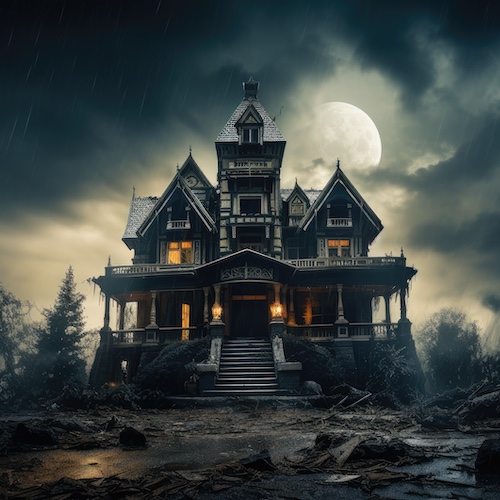
Lawns littered with skeletons. Doorways shrouded with spiderwebs. Cackling witches. Spooky season is upon us again, which means it’s time to carve some pumpkins, pick out your costumes, and embrace the neighborhood ghosts.
While many Americans lean into the notion of ghouls and goblins only around Halloween, some say they’d have no problem buying into haunted houses permanently, according to a recent survey from Rocket Mortgage®.
That survey, released today, polled more than 1,000 Americans about their perspectives on spirits and apparitions in their homes. Some ghastly discoveries: A significant portion of our friends and neighbors claim to currently live in a haunted house or to have lived in a haunted house, and even more say they would buy a house suspected to be haunted.
Key takeaways:
- Nearly two-thirds of Americans (65%) would consider buying a haunted house, with 39% saying yes outright and another 26% saying maybe.
- One in three said they’ve lived in a haunted home.
- Among the respondents who said they currently live in a haunted house or used to live in one, 43% said their ghosts were friendly.
- Almost 41% of those surveyed said they would try to befriend the ghost if they found out their house was haunted.
Time to hang a ‘House for Sale: Haunted’ sign
Perhaps the most boo-tiful part of this year’s findings (see what we did there?) is that Americans appear to be warming up to spirits and specters.
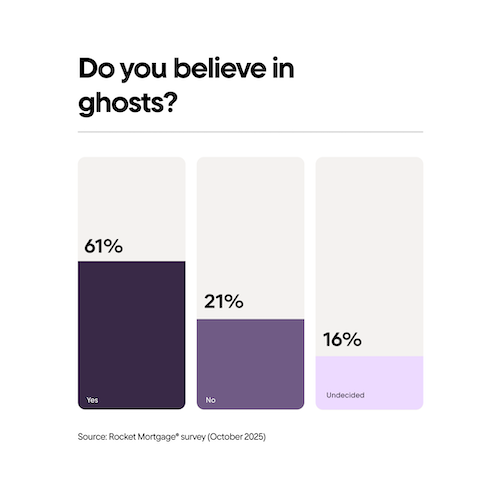
Belief in the paranormal is more common than you might think. According to our survey, 61% of respondents said they believe in ghosts, while 21% said they do not, and 18% were undecided. With the majority open to the idea of the supernatural, it’s no surprise that many buyers might be willing to coexist with a ghost in their new home.
In the 4 years since Rocket Mortgage’s last survey on haunted houses was published, a larger number of respondents are open to recognizing the presence of ghosts and are willing to say they’ve had supernatural experiences. Along with a significant increase in spending on Halloween decorations over the past several years, Americans have experienced a shift in mindset about haunted houses.
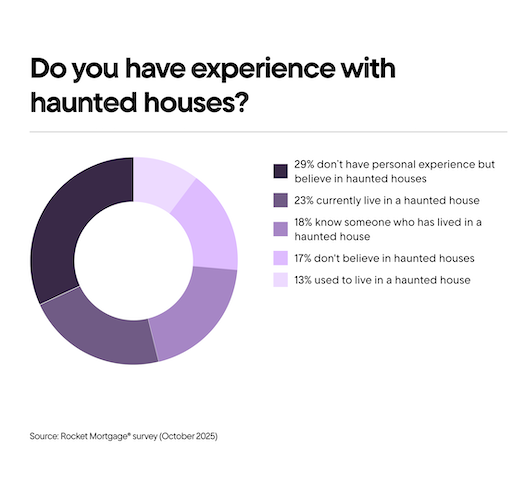
A whopping 36% of survey respondents said they either currently live in a haunted house or used to live in one. Another 18% said they know someone who has lived in a haunted house. And 29% said that while they don’t have any previous experience with haunted houses, they do believe in them. Only 17% said they don’t believe in haunted houses at all.
Maybe one reason for the surge in those partial to haunted houses is that 43% of the ghosts encountered by survey respondents have been friendly, and 20% have been mischievous. Just 26% said their ghosts were spooky or angry – the kind that might spark some serious nightmares.
Many Americans who claimed to have had experience with haunted houses could have referenced the movie “Beetlejuice” when describing how they knew a ghost was present. More than 64% of respondents said they felt a strong presence, while 61% said they heard mysterious noises, and 49% said they heard unaccountable footsteps. A notable 37% of respondents said they saw apparitions, “Ghostbusters”-style (minus the slime).
Are stigmatized properties deal-breakers?
It’s one thing to experience a haunted house; it’s quite another to voluntarily choose to live in one. A whopping 39% of respondents to the 2025 Rocket Mortgage haunted house survey said they would buy a house they knew was haunted, and 26% more said they would at least consider it. This means almost two-thirds of Americans would consider buying a haunted house. Only 35% of respondents said they’d rule out a haunted house completely.
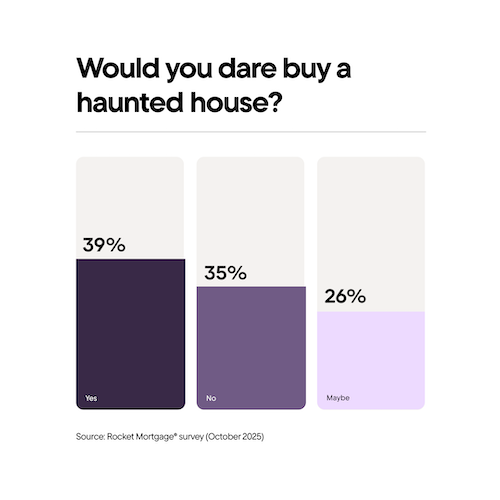
For most Americans, a haunted house isn’t worth full price. Nearly four in 10 said they’d need 40% – 59% off the asking price to seal the deal. Another 29% said they would consider a haunted house only if the discount was 20% – 39%. A small group – 15% of respondents – would buy with a discount of just 19% or less.
(As an aside, a Toms River, New Jersey, house used for the 1979 movie “The Amityville Horror” sold in 2023 for $1.46 million, after listing at $1.7 million – a 14.1% drop.)
When pressed to think critically about ghosts, respondents gave several reasons they might be less willing to buy a “ghost house”:
- The home is newly built but on land with a rumored haunting (41%).
- The home is pre-1950 with charming historical features (41%).
- A prior owner reports paranormal activity (38%).
- The home has been sitting on the market despite a good price (32%).
- Neighbors or online forums say the house is haunted, but the owner denies it (23%).
The biggest deal-breakers for buying a haunted house were straightforward: 40% said they would steer clear if the property felt isolated or creepy, 34% wouldn’t buy a home where a violent or traumatic death occurred, and 33% drew the line at a house located next to (or on top of) a cemetery.
This means an abode like the one in the classic 1959 movie “House on Haunted Hill,” where five strangers were terrorized by ghosts during an attempt to survive the night for a $10,000 prize, likely wouldn’t get much interest – at least not from modern-day Americans.
Finding friends in ghost houses
Discovering that they live in a so-called “ghost house” would prompt some people to make interesting choices.
Respondents to our survey were asked what they would do if they found out their house was haunted, and 41% said they would attempt to make friends with the ghost and learn more about its history.
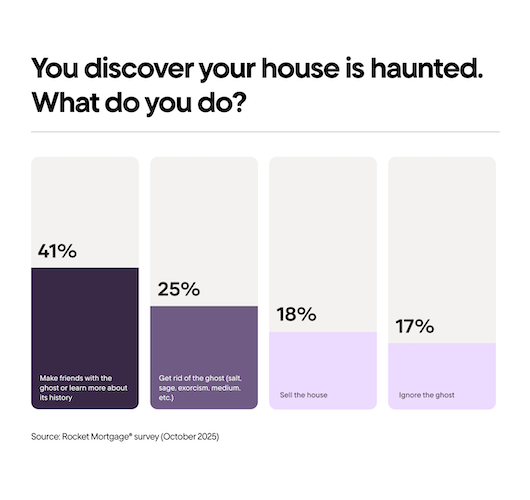
Nearly 25% of respondents took the opposite position, saying they would do whatever they could (including the use of salt, sage, or even an exorcism) to get rid of the ghost. About 18% of respondents said they would sell the house, while 17% said they would just ignore the ghost.
How do ghosts affect property value?
The presence of an apparition would leave many Americans feeling anxious about the resale value of their home. An overwhelming 82% of survey respondents said they would be “extremely,” “very,” or “somewhat” concerned about how much value they could get in the sale of a haunted house, while only 17% said they would be “a little” or “not at all” concerned.
Concern levels would likely depend on the ghost in question. Ghouls like the one in “Poltergeist,” for example, could be damaging to the resale value of a home, while goblins like those in Disney’s “Haunted Mansion” might not be as detrimental.
That said, since nearly two-thirds of Americans (65%) would consider buying a haunted house – with 39% saying yes outright and another 26% saying maybe – homeowners shouldn’t let resale value make them uneasy.
No matter how spooked one might feel, it’s important to remember that haunted houses aren’t necessarily something to avoid. Every ghost has a tale to tell: Embracing them could make your own narrative – and the story of your home – richer over time.
Methodology: Learning how Americans feel about haunted houses
Rocket Mortgage surveyed 1,037 individuals, aged 24 and older, to find out how Americans feel about haunted houses. The survey was conducted online in October 2025.

Matt Villano
Matt Villano has covered the mortgage, real estate, and personal finance spaces for nearly two decades as a freelance writer. In that time he has contributed to CNN, The New York Times, The Wall Street Journal, AFAR, Travel + Leisure, Entrepreneur, San Francisco magazine, Sierra, Bloomberg BusinessWeek, Fast Company, and more. He is based in Healdsburg, California.
Related Resources

8-minute read
12 questions to ask when buying a house
For inexperienced home buyers, it’s hard to know what questions to ask when buying a house. Use this checklist to make sure you get all the important info...
Read more
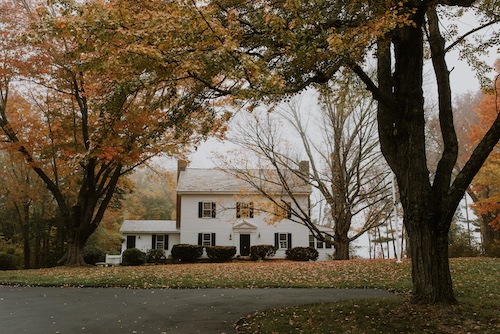
6-minute read
What is a zombie foreclosure?
Zombie foreclosures demonstrate the risks of leaving before foreclosure ends. Understand these homes and their potential to resurface and create problems later.
Read more
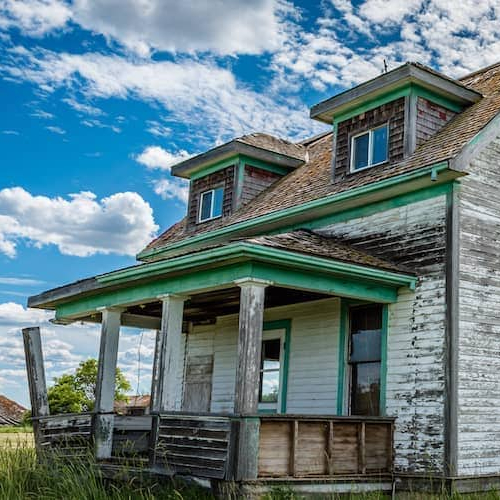
5-minute read
Distressed property: Everything you need to know
A distressed property is a house that’s on the verge of foreclosure or has been reclaimed by a lender. Learn more about investing in distressed homes h...
Read more